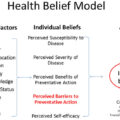Ecological model of health behavior is a model that emphasizes the environmental and policy contexts of behavior while incorporating social and psychological influences. Ecological models lead to the explicit consideration of multiple levels of influence, thereby guiding the development of more comprehensive interventions.
Ecological models recognize multiple levels of influence on health behaviors, including:
- Intrapersonal/individual factors, which influence behavior such as knowledge, attitudes, beliefs, and personality.
- Interpersonal factors, such as interactions with other people, can provide social support or create barriers to interpersonal growth that promotes healthy behavior.
- Institutional and organizational factors, including the rules, regulations, policies, and informal structures that constrain or promote healthy behaviors.
- Community factors, such as formal or informal social norms that exist among individuals, groups, or organizations, can limit or enhance healthy behaviors.
- Public policy factors, including local, state, and federal policies and laws that regulate or support health actions and practices for disease prevention including early detection, control, and management.
What Are Some Examples of Ecological Models?
Examples of Ecological Models include:
- Project HEART (Health Education Awareness Research Team) used an ecological model to design a health promotion and disease prevention program to address cardiovascular disease risk factors. The project uses a community health worker (CHW) promotora model to provide services.
- CDC’s Colorectal Cancer Control Program (CRCCP) was designed to address multiple factors of influence on colorectal cancer prevention, using ecological model components.
- Rural networks and coalitions often acknowledge multiple factors of influence and may be designed using theoretical components of ecological models. More information is available in the Rural Health Networks and Coalitions Toolkit.
How Are Ecological Models Applied?
The ecological perspective is a useful framework for understanding the range of factors that influence health and well-being. It is a model that can assist in providing a complete perspective of the factors that affect specific health behaviors, including the social determinants of health. Because of this, ecological frameworks can be used to integrate components of other theories and models, thus ensuring the design of a comprehensive health promotion or disease prevention program or policy approach.
The Healthy People 2020 framework addresses the importance of ecological models in health promotion and disease prevention. Programs are most likely to be effective when they are designed to address the multiple levels of influence on health behaviors.
What Are The Limitations Of The Ecological Model?
The social-ecological model is useful in understanding the reasons as to why we behave the way we do; however, the model still possesses limitations. For example, the model may tell us what factors are contributing to a certain situation, the model does not give insight into how much an effect has over another. This makes it hard for families to uncover which aspect of the model they can focus more on to make a change in their environment or personal actions. Implementation of the social-ecological model into communities can be difficult because of cost. For example, it will be difficult to implement violence prevention programs in cities that have high crime and violence rates.
Limitations of the Social-Ecological Model include:
- Lack of motivation for change in the environment
- Changing lifestyles can be extremely difficult
- Not all diseases can be prevented
- Many people are in denial and do not believe they are at risk.
ALSO READ: Who developed the social cognitive theory?






